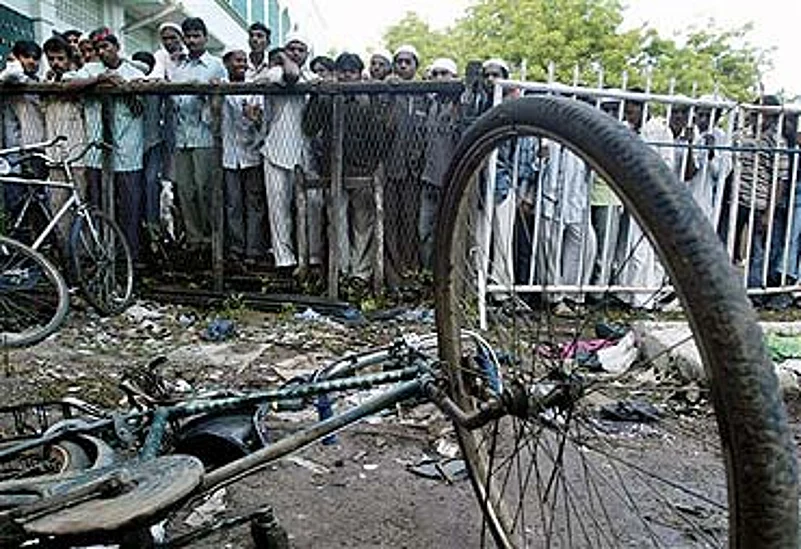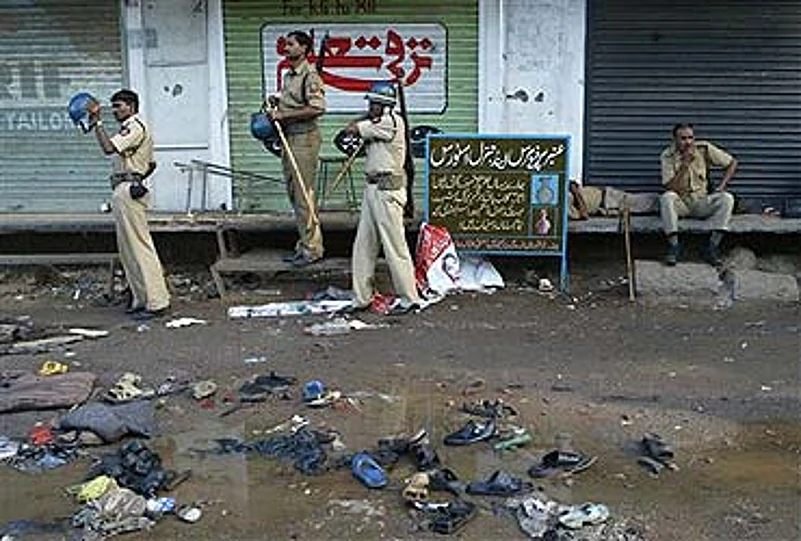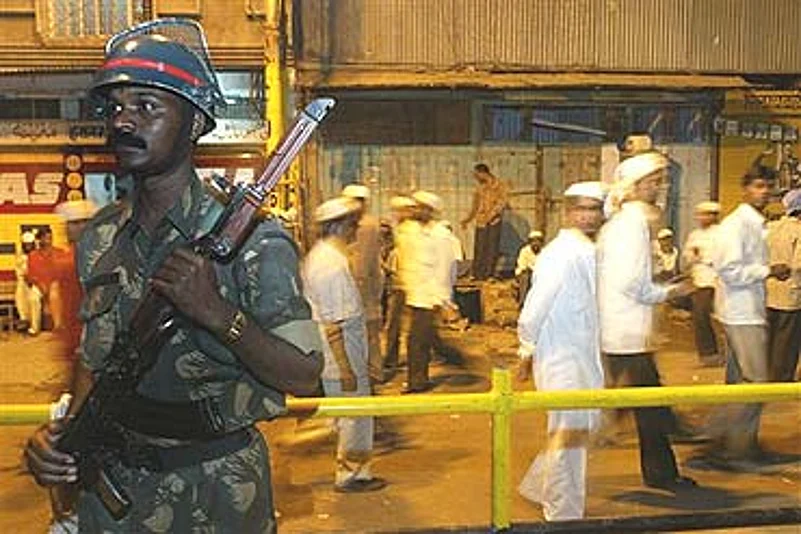The holy Shab-e-Barat is when Muslims seek divine blessings for thewell-being of mankind. Muslim devotees spend the night at mosques and homes,offering special prayers and reciting from the holy Quran. They hold milad mehfil, visit the graves of their near and dear ones and offer fateha for the peace of the departed souls.
Large number of Muslims were out of their houses, congregating in mosques andgraveyards. Malegaon was no different. Terrorists chose just that moment tostrike again in Maharashtra, killing at least 38 people and injuring over 100 in three blasts including one in a mosque inthe communally sensitive Muslim-dominated town of Malegaon.
Advertisement
An estimated 2,000 people who had gathered for Friday prayers on Shab-e-Baratat Noorani Mosque in the Bada Kabristan (graveyard) area at Friday prayer time were among the casualties.

The blasts occurred just before 2 pm at three different places, nearly simultaneously, leaving a trail of death and destruction.
Malegaon, which has a history of communal violence, is under curfew tonight as thecentre and the state government rushed paramilitary forces to deal with the situation officially described as tense but under control.
Today's explosions —only four days prior to the verdict in the 1993 Mumbai blasts case due on Tuesday.—came less than two months after train blasts in Mumbai killed nearly 200 people on July 11.
Advertisement
Besides the Noorani Mosque in the Bada Kabristan (graveyard) area where people had come to pray for the dead on the occasion ofShab-e-Barat, the blasts also rocked the busy Mushaira Chowk and Ayesha Nagar locality.
A near-stampede broke out immediately after the blasts as devotees, including children, rushed out of the narrow gateof the mosque in panic with many of them trampling over the dead bodies and those seriously injured.
Local administration officials said over 100 people injured in the blasts were rushed to the Wadia hospital and other hospitals in the town while some of the seriously wounded were moved toNashik, about 110 km from here, for treatment.
The whole area was splattered with blood and limbs. The devotees also helped the injured rush to nearby hospitals on every available mode of transport including push carts.

Meanwhile, mobile networks remained jammed in Malegaon and Nasik, similar to the situation that developed after the blasts on July 11. Communication amongst senior police officers became difficult due to the jammednetworks. Union Home Secretary V K Duggal said in Delhi it was too premature to say about the blast material but initial reports suggested that the explosive at Mushaira Chowk was tied to a bicycle.
Another report suggests that a beggar girl was carrying a tin which perhaps contained some explosives, he said.Some reports said that the bomb which went off at the mosque was kept in a bouquet.
Advertisement
A team of National Bomb Data Centre of elite National Security Guard had been rushed to the spot to confirm the nature of explosives used.
Although there was deployment of paramilitary forces in strength in the townowing to the recently concluded Ganesh festival and today's 'Shab-e-barat'ceremony, police found it difficult to reach the site of the blasts.
Angry residents pelted stones on policemen and prevented them from reaching theblasts site while a mob of nearly 500 persons laid a siege of Azadnagar policestation. A mob attacked Malegaon’s Superintendent of Police when a police teamtried to enter the blast site. Police fired 10 rounds to disperse the mob.Police had to fire in the air to disperse the mob which damaged some policevehicles.
No group has taken responsibility for the blasts that took place nearly twomonths after the series of explosions in trains in Mumbai on July 11 that leftclose to 200 people dead.
Advertisement

The Centre has rushed over 3000 jawans of the CRPF and Rapid Action Forces besidesover 500 personnel of Special Reserve Police to assist the local administrationin maintaining law and order, while the whole country remains on high-alert.
President A P J Abdul Kalam, Prime Minister Manmohan Singh, former Prime Minister Atal Bihari Vajpayee and Congress President Sonia Gandhi have condemned the blasts and asked the people to maintain communal harmony. Messages of condemnations have poured in from America to Bangladesh.
Union Home Minister Shivraj Patil, who is rushing here tomorrow, said the "bigger design" of those behind the blasts in Malegaon of Maharashtra is to see that different sections of the society clash and create more turmoil.
Maharashtra DGP P S Pasricha said it was too early to link the Malegaon blasts with the Mumbai serial bomb blasts of July 11 or the earlier explosions at Nandedand Parbhani last year.He appealed to the people of Maharashtra to be more alert and vigilant to avert such incidents.




















